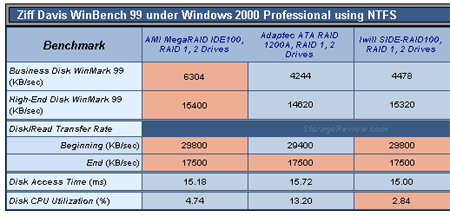Terry Baranski van Storage Review komt met een artikel over twee goedkopere RAID kaartjes, de Iwill Side-RAID100 en de Adaptec ATA RAID 1200A. De Iwill Side-RAID100 gebruikt de welbekende Highpoint HPT370 IDE-RAID chip. De controller ondersteunt IDE-RAID 0,1 en 0+1, met een maximum van vier drives. De stripe-grootte is in te stellen tussen 4K en 64K. De Adaptec ATA RAID 1200A maakt eveneens gebruik van de HPT370 RAID controller en ondersteunt IDE-RAID 0, 1 en 0+1. Het is eveneens mogelijk om vier drives er aan te hangen. De stripe-grootte is hier instelbaar tussen 16K en 64K.
Bij de Ziff David WinBench 99 benchmark blijkt duidelijk dat de 1200A veel gebruik maakt van de CPU. Terwijl de Iwill SIDE-RAID100 slechts 2,93% verbruikt, zit de Adaptec ATA RAID 1200A aan de 13,13%. Daarnaast is de de access time van de Adaptec-drive ook 0,5ms hoger dan de andere RAID-controllers. Hieronder de conclusie:
In light of the very impressive performance of the Adaptec ATA RAID 2400A, high hopes for the 1200A may be justified. Unfortunately, the 1200A fails to impress in the performance department. IOMeter results are, overall, significantly worse than competing cards which, because of their cost-sensitive nature, don't have blazingly fast random IO performance to begin with. The 1200A's 54MB/sec STR limit is also far from impressive, especially with competing cards hovering in the 80MB/sec range.
The SIDE-RAID100, on the other hand, performs on par with the FastTrak100 and MegaRAID IDE100 overall. It's also one of the cheapest ATA RAID controllers available - attaining the retail kit for under $50 is possible. Considering the average ~$75 price tag of competing cards, this makes Iwill's adapter an attractive option for those seeking an entry-level ATA RAID card.
Contrasting the performance of the 1200A and SIDE-RAID100 demonstrates that the actual RAID controller used on a given adapter is by no means the sole determiner of performance - both of these cards use the HPT370 controller yet perform quite differently. This illustrates that there are other aspects to performance - such as drivers and firmware - that also play a role.
 |
